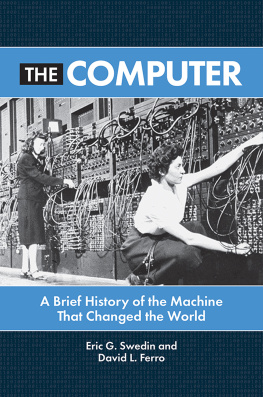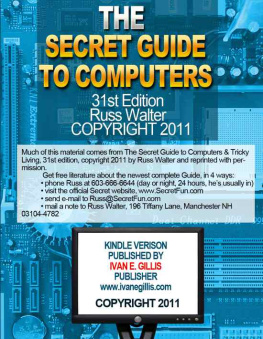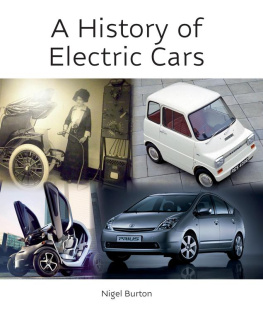Thank you for buying this ebook, published by NYU Press.
Sign up for our e-newsletters to receive information about forthcoming books, special discounts, and more!
Sign Up!
About NYU Press
A publisher of original scholarship since its founding in 1916, New York University Press Produces more than 100 new books each year, with a backlist of 3,000 titles in print. Working across the humanities and social sciences, NYU Press has award-winning lists in sociology, law, cultural and American studies, religion, American history, anthropology, politics, criminology, media and communication, literary studies, and psychology.
Electric Dreams
Acknowledgments
This book could not have been written without the guidance and intellectual example of the following people: Janice Radway, Jane Gaines, Lawrence Grossberg, Fredric Jameson, and Barbara Herrnstein Smith. Cathy Davidson, Joseba Gabilondo, and Michael Hardt were also generous with their advice and encouragement. Joan McNay, Sandy Mills, Sandy Swanson, and Pamala Terterian time and again went beyond the call of duty in the face of scheduling crises and paperwork pileups.
The Communication Department at Georgia State University provided the research funding that allowed me to finish this project. My friends and colleagues at GSU have been an inspiration. Ive received great feedback from both departmental colloquia and lunchtime conversation. Thanks to Gayle Austin, Kay Beck, Jack Boozer, Michael Bruner, Allaine Cerwonka, David Cheshier, James Darsey, Yuki Fujioka, Mark Gallagher, Cindy Hoffner, Greg Lisby, Marian Meyers, Ray Miller, Jason Mittell, Merrill Morris, Mary Ann Romski, Sheldon Schiffer, Greg Smith, Sujatha Sosale, Mary Stuckey, Leonard Teel, Cal Thomas, Nik Vollmer, David Weberman, and Carol Winkler.
My students at Duke and GSU always taught me as much as I taught them. Special thanks to the subscribers of Tedlog, the listserv thats kept me in touch with so many, and to my graduate research assistants, Mark Cornwell, Heavenly Littleton, Bryce McNeil, Sumitra Srinivasan, Laszlo Strausz, and Keith Tims. Susan and Victor McFarlane-Alvarez contributed their formidable design savvy to the books look. Elizabeth Strickler of the Digital Arts and Entertainment Lab provided much-needed technical support. Thanks also to the readers of Tedlog, first as a listserv, then a blog.
This work has also benefited in innumerable places from the feedback of Robert Allen, Lynn Appleton, Anders Carlsson, Pat Hemmis, Heather Hicks, Norman Holland, Henry Jenkins, Steven Jones, Henry Lowood, Jean Mansfield, Midori McKeon, Janet Murray, Howard Segal, Jonathan Sterne, Jaakko Suominen, and Edward J. Valauskas.
Ellen Gartrell of the John W. Hartman Center for Advertising History at Duke University was invaluable, tracking down copies of old television commercials and print ads Id been afraid Id never gain access to. I would also like to thank the staffs of the Smithsonian Museum of American Historys Division of Information Technology and Society and the Museum of Broadcasting in New York.
At NYU Press, Ive been thrilled by the support of Eric Zinner and Emily Park. Im especially appreciative of the two anonymous reviewers who pushed me to anchor this book historically while taking it all the way into the present and future.
Many friends have lent me their support and advice over the years of writing, including Renu Bora, Gavin Edwards, Wendy Greene, Maude Hines, Charles Lewis, Svetlana Mintcheva, Andrea Moed, Rob Sheffield, Gillian Silverman, Jay Smith, Viv Soni, Mark Sternman, and Ursula Swiney. I couldnt have made it through the last year without the Werewolves, who introduced me to the joy of Kingdom of Loathing: Nichole Arnault, Emily Noonan, Stephanie Paulk, Nate Steiner, Jere Recob Tesser, and Louis Tesser. My neighbors, the Horvieths, have shown me what family is all aboutthanks Vicki, Richard, Jackie, Jordan, Joe, Jacob, and Joshua. Belinda Dowdy, James Dykes, Mike Greenberg, Frank Meaux, Linda Rayner, Darlene Swain, Shannon Van Wey, Ken West, and Samuel Yanuck helped keep me in one piece along the way. And eight wonderful pets reminded me to stop and smell the cat food: Moby, the Dude, Callie, Cheeto, Halley, Wilson Peanuthead Crybabyface, and two lost along the way, Minnlow, and Morannon.
My parents, Elaine and Joel Friedman, and my sister, Jennifer, have supported me ever since my first TRS-80. I cant wait to see what the world will look like to my niece, Sophie, as she grows up a child of the twenty-first century. Kate Lewis has been my rock through this whole process. I never could have gotten this far without her strength, wisdom, and love.
Finally, Id like to thank the friends Ive lost during this project: Renee Crist, Josephine Friedman, Irwin Greenbaum, and Brian Selsky.
Introduction
The Dialectic of Technological Determinism
Is Resistance Futile?
Why do we think what we think about computers? A computer is just a tool. Or, more specifically, a mediuma means of processing and communicating information. It lets us do so with incredible speed and efficiency, but in principle, the hardware is as open-ended as a blank piece of paper. Just as the tiny wood fibers of a sheet of paper can absorb ink into any pattern a user might create, the binary circuits of a computer can store any input.
But we rarely think of a computer as a blank slate, and for good reasons. The writer beginning a manuscript with pencil and paper sees only the blank page, two-dimensional and practically weightless. As I sit here at my computer, on the other hand, the means of production making my intellectual work possible are almost overwhelming: a keyboard clacks at every stroke, a mouse sits off to the side, a heavy monitor takes up much of the desk, and the big, rectangular processor makes whirring, chugging noises (and on rare, unpleasant occasions, suddenly stops working altogether). My entire office is oriented around the demands of my computer: the keyboard sits on a pull-out shelf to be at the ergonomically correct height for my hands (I have carpal tunnel syndrome), the monitor is positioned to avoid glare from any window, and behind my desk, nests of wires snake from monitor to processor to printer to speakers to modem to phone line to power supply to










